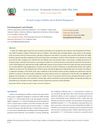
Autonomous robotic surgery is advancing but still requires human supervision for complex procedures.
 January 2024 in “Jurnal Ilmu Kesehatan Hewan”
January 2024 in “Jurnal Ilmu Kesehatan Hewan” A mixed breed dog with skin issues improved significantly after treatment and needs to avoid dampness and certain bath products to prevent it from coming back.

N793 may improve hair density in people with mild hair thinning.
 January 2024 in “Regenerative Biomaterials”
January 2024 in “Regenerative Biomaterials” Metal organic frameworks-based scaffolds show promise for tissue repair due to their unique properties.
 January 2024 in “Journal of Hard Tissue Biology”
January 2024 in “Journal of Hard Tissue Biology” A high-fat diet may weaken tongue structure by reducing certain protein genes.
 January 2024 in “Brazilian Journal of Veterinary Pathology”
January 2024 in “Brazilian Journal of Veterinary Pathology” The horse had a rare disease causing weight loss and skin issues, leading to euthanasia due to poor treatment options.
 November 2023 in “Jurnal Ilmu Kesehatan Hewan”
November 2023 in “Jurnal Ilmu Kesehatan Hewan” The dog's condition improved after 21 days of treatment.
 November 2023 in “Frontiers in veterinary science”
November 2023 in “Frontiers in veterinary science” The study provides insights into hair growth mechanisms in yaks.
 October 2023 in “Biomedical science and engineering”
October 2023 in “Biomedical science and engineering” Innovative methods are reducing animal testing and improving biomedical research.

Bee pollen, green tea, essential oils, and various plant extracts improve skin and hair health.
 September 2023 in “Journal of Parasite Science”
September 2023 in “Journal of Parasite Science” The dog's skin condition improved significantly after seven days of treatment.
 September 2023 in “Jurnal Ilmu Kesehatan Hewan”
September 2023 in “Jurnal Ilmu Kesehatan Hewan” The dog improved significantly after treatment for skin mites and fungi.
 August 2023 in “Acta Scientific Veterinary Sciences”
August 2023 in “Acta Scientific Veterinary Sciences” Ivermectin, Vimeral syrup, and Benzyl Benzoate effectively treat sarcoptic mange in rabbits.
 July 2023 in “Indian Journal of Animal Health”
July 2023 in “Indian Journal of Animal Health” FGF-5 promotes Cashmere goat hair growth by increasing keratin genes and reducing certain LncRNA and target genes.
 July 2023 in “International journal of pharmacognosy and life science”
July 2023 in “International journal of pharmacognosy and life science” The herbal hair oil made from various plants might be a good alternative to synthetic hair loss treatments.
 May 2023 in “Journal of Pharmaceutical Research”
May 2023 in “Journal of Pharmaceutical Research” Neem is highly beneficial for health and beauty with no major side effects.
 April 2023 in “Tikrit Journal of Pharmaceutical Sciences”
April 2023 in “Tikrit Journal of Pharmaceutical Sciences” Deferasirox effectively reduces iron overload in ß-thalassemia patients but may cause some manageable side effects.

Custom skincare can be made based on genes, fewer cats in Lublin have FeLV/FIV than national average, and studies also looked at small water bodies, river pollution, guppy growth, toxins in biochars, palm oil issues, and pumpkin seed oil for hair strength.
 April 2023 in “Clinical theriogenology”
April 2023 in “Clinical theriogenology” The dog's skin condition improved after removing a tumor that was causing hormone imbalances.
 April 2023 in “Veterinary world/Veterinary World”
April 2023 in “Veterinary world/Veterinary World” Six types of bugs were found on goats in Bulgaria, with Linognathus stenopsis being the most common.

Higher TGF-β signaling may increase skin cancer risk in organ transplant recipients.
 January 2023 in “Open veterinary journal”
January 2023 in “Open veterinary journal” Cow blood vessel cell secretions helped heal rat burn wounds and may treat burns and hair loss.
 January 2023 in “International journal of advances in scientific research and engineering”
January 2023 in “International journal of advances in scientific research and engineering” Anthocyanins from fruits and vegetables may help prevent and treat colorectal cancer safely.

Social media data can help track and predict COVID-19 symptoms and trends.
 December 2022 in “bioRxiv (Cold Spring Harbor Laboratory)”
December 2022 in “bioRxiv (Cold Spring Harbor Laboratory)” MicroRNA-205 helps hair grow by changing the stiffness and contraction of hair follicle cells.
 November 2022 in “bioRxiv (Cold Spring Harbor Laboratory)”
November 2022 in “bioRxiv (Cold Spring Harbor Laboratory)” MOF controls skin development by regulating genes for mitochondria and cilia.
 October 2022 in “Research Square (Research Square)”
October 2022 in “Research Square (Research Square)” The conclusion is that certain chemicals from Bacillus subtilis help improve plant root growth through a hormone-related process.
 September 2022 in “International journal of pharmaceutical quality assurance”
September 2022 in “International journal of pharmaceutical quality assurance” The herbal shampoo is less damaging and improves hair's appearance.
 July 2022 in “International journal of dermatology, venereology and leprosy sciences”
July 2022 in “International journal of dermatology, venereology and leprosy sciences” More frequent and severe skin problems are linked to higher daily alcohol consumption.

Early identification of lupus through skin signs and blood tests is crucial in India.






























